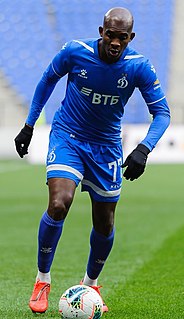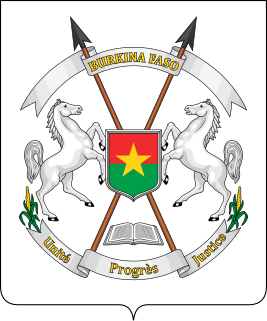| |||||
| Decades: | |||||
|---|---|---|---|---|---|
| See also: | |||||
This article is a list of events in the year 2017 in Burkina Faso .
| |||||
| Decades: | |||||
|---|---|---|---|---|---|
| See also: | |||||
This article is a list of events in the year 2017 in Burkina Faso .

Burkina Faso is a landlocked country in West Africa with an area of 274,200 km2 (105,900 sq mi), bordered by Mali to the northwest, Niger to the northeast, Benin to the southeast, Togo and Ghana to the south, and the Ivory Coast to the southwest. It has a population of 20,321,378. Previously called Republic of Upper Volta (1958–1984), it was renamed Burkina Faso by President Thomas Sankara. Its citizens are known as Burkinabè, and its capital and largest city is Ouagadougou.

Ouagadougou is the capital of Burkina Faso and the administrative, communications, cultural, and economic centre of the nation. It is also the country's largest city, with a population of 2,415,266 in 2019. The city's name is often shortened to Ouaga. The inhabitants are called ouagalais. The spelling of the name Ouagadougou is derived from the French orthography common in former French African colonies.

Blaise Compaoré is a Burkinabé-Ivorian former politician who served as the second president of Burkina Faso from 1987 to 2014. He was a close associate of the first president, Thomas Sankara, during the 1980s, and in October 1987, he led a coup d'état during which Sankara was killed. Subsequently, he introduced a policy of 'rectification', overturning the leftist and Third Worldist policies pursued by Sankara. He won elections in 1991, 1998, 2005 and 2010, in what were considered unfair circumstances. His attempt to amend the constitution to extend his 27-year term caused the 2014 Burkinabé uprising. On 31 October 2014, Compaoré resigned, whereupon he fled to the Ivory Coast.

Jean-Baptiste Philippe Ouédraogo, also referred to by his initials JBO, is a Burkinabé physician and retired military officer who served as President of Upper Volta from 8 November 1982 to 4 August 1983. He has since mediated a few national political disputes and operates a clinic in Somgandé.

Bobo-Dioulasso is a city in Burkina Faso with a population of 904,920 ; it is the second-largest city in the country, after Ouagadougou, Burkina Faso's capital. The name means "home of the Bobo-Dioula".

Air Burkina SA is the national airline of Burkina Faso, operating scheduled services from its main base at Ouagadougou Airport. to one domestic destination, Bobo-Dioulasso, as well as regional services to Togo, Benin, Mali, Niger, Côte d'Ivoire, Senegal and Ghana. From 2001 to 2017, the airline was majority owned by an AKFED/IPS consortium, but is now back in government ownership, with reports that a new investor is being sought.

The Catholic Church in Burkina Faso is part of the worldwide Catholic Church, under the spiritual leadership of the Pope in Rome. According to the CIA Factbook, in 2018 17 percent of the population are members of the Catholic Church.
Articles related to Burkina Faso include:

Charles Kaboré is a Burkinabé professional footballer who plays as a defensive midfielder for French Ligue 2 club Niort and the Burkina Faso national team. A Burkina Faso international since 2006, he has become the country's most capped player.

Football is the most popular sport in Burkina Faso. And the national association can look back on recent developments with a great deal of pride. Reaching the semi-finals of the African Cup of Nations on home soil in 1998, reaching the knockout stage for their first FIFA World Youth Championship in 2003, and appearances at two final competitions of the CAF U-17 Cup, as well as third place at the FIFA U-17 World Championship in Trinidad and Tobago in 2001 are the country's outstanding achievements at international level. The nations most famous players include Kassoum Ouegraogo, nicknamed Zico, who had his most successful seasons with Espérance de Tunis before ending his career in Germany, Siaka Ouattara, who spent his entire career with Mulhouse in France, and Moumouni Dagano, who was voted best African player in Belgium in 2001, when he played for the Belgian side Genk. He later went on to play for the French side Guingamp before transferring to another French team, FC Sochaux in 2005. Burkina Faso received an unexpected free pass into the group stage of the 2006 FIFA World Cup qualification process, when their opening round contestant, the Central African Republic, withdrew from the competition. This gave the West Africans, who were at that stage ranked 14th on the continent, the certainty that their name would be in the hat when the Preliminary Draw for the 2006 FIFA World Cup in Germany was made. They got off to a flying start, beating Ghana 1-0 in their opening match and laying down a marker for their Group 2 adversaries South Africa, Cape Verde Islands, Congo DR and Uganda. The victory train began to come off the rails with two defeats to Cape Verde, and with a record of two wins and three losses, Burkina Faso were up against it at the half-way stage. Frenchman Bernard Simondi took over the coaching reins from Ivica Todorov and made the team harder to beat at home, even recording wins over South Africa and Congo DR, but in the end it was not quite enough, and the likes of Abdoulaye Cisse, Moumouni Dagano, and Wilfred Sanou went no further in the competition.
Valère Dieudonné Somé was a politician and scholar from Burkina Faso. Somé was the leader of the Union of Communist Struggles - Reconstructed (ULC-R) during the 1980s. He was an Anthropo-Economist, and headed research at the INSS-CNRST.
The 2011 Burkina Faso protests were a series of popular protests in Burkina Faso.

General elections were held in Burkina Faso on 29 November 2015. The elections were the first national elections in the country since the 2014 Burkinabé uprising and the departure of President Blaise Compaoré, who had ruled Burkina Faso for 27 years. The party of former President Compaoré, the Congress for Democracy and Progress, was banned from presenting a presidential candidate in the presidential elections but was still able to participate in the parliamentary election.

The 2015 Burkina Faso coup d'état attempt was a failed coup d'état launched on 16 September 2015 in Burkina Faso, when members of the Regiment of Presidential Security (RSP) – a controversial autonomous military unit, formed under President Blaise Compaoré – detained the country's government. Among those detained were the transitional President Michel Kafando, Prime Minister Yacouba Isaac Zida, and numerous members of the cabinet. This transitional government was formed in the wake of the 2014 Burkinabé uprising, when a popular movement overthrew the long-time president Compaoré, who himself had come to power in a 1987 coup against the left-wing leader Thomas Sankara. New general elections were planned for 11 October 2015.

On 15 January 2016, gunmen armed with heavy weapons attacked the Cappuccino restaurant and the Splendid Hotel in the heart of Ouagadougou, the capital of Burkina Faso. The number of fatalities reached 30, while at least 56 were wounded; a total of 176 hostages were released after a government counter-attack into the next morning as the siege ended. Three perpetrators were also killed. The nearby YIBI hotel was then under siege, where another attacker was killed. Notably, former Swiss MPs Jean-Noël Rey and Georgie Lamon were killed. Responsibility for the attack was claimed by Al-Qaeda in the Islamic Maghreb (AQIM) and Al-Mourabitoun.

Burkina Faso–India relations refers to the international relations that exist between Burkina Faso and India. Burkina Faso maintains an embassy in New Delhi. India maintained an embassy in Ouagadougou from November 1996 until its closure in July 2002. Currently, India maintains an honorary consulate in Ouagadougou, which functions under the jurisdiction of the High Commission of India in Accra, Ghana.
On 4 August 1983 a coup d'état was launched in the Republic of Upper Volta in an event sometimes referred to as the August revolution or Burkinabé revolution. It was carried out by radical elements of the army led by Thomas Sankara and Blaise Compaoré, against the regime of Major Jean-Baptiste Ouédraogo. Ouédraogo had been brought to power in a 1982 coup with the Conseil de Salut du Peuple (CSP), a body composed of military officials of different ideological backgrounds. The CSP chose Sankara as Prime Minister of Upper Volta in January 1983. As his tenure progressed, Ouédraogo found himself unable to reconcile the conservative and radical factions of the CSP, whose disagreements were leading to a political stalemate. On 16 May he purged his government of pro-Libyan and anti-French elements, disbanded the CSP, and had Sankara and several other important officials arrested. This move sparked discontent among Sankara's supporters. Sankara was eventually released while one officer, Compaoré, began to organise military resistance to the government.

An ongoing war and civil conflict between the Government of Burkina Faso and Islamist rebels began in August 2015 and has led to the displacement of 1.9 million people and the deaths of at least 2,000 civilians and combatants.

Ibrahim Traoré is a Burkinabé military officer who has been the interim leader of Burkina Faso since the 30 September 2022 coup d'état which ousted interim president Paul-Henri Sandaogo Damiba. At age 34, Traoré is the world's youngest currently-serving world leader.